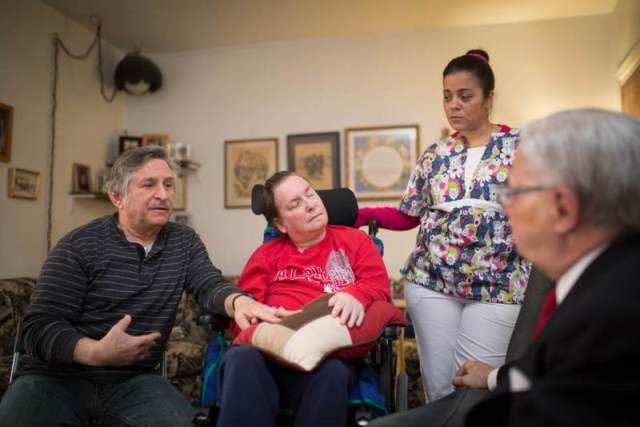
Imagine this scene: A woman feels a familiar, nagging stiffness in her lower back as she leans over the edge of the tub to bathe her teenage daughter. Her daughter, who has a significant degenerative muscular disease, sits quietly and securely on a customized bath chair that fits snugly inside the tub. The tub area is decorated with different pieces of adaptive equipment such as a specialty grab bar, floor mat, hand-held shower head, and other items to make the bathing process possible for a person who cannot physically jump in and out of the shower. From start to finish, the entire bathing process takes more than an hour to safely complete.
Whether it is giving a bath, doing a tracheostomy change, starting a gastronomy tube feed, or transporting someone with multiple pieces of medical equipment, families who care for a loved one with a significant medical condition live a vastly different lifestyle than many other families. This lifestyle is not easily understood unless you’ve experienced it.
Legislative advocacy makes a difference
We have learned that when our clients and families talk to our elected officials and the people who make decisions about health care funding and regulations, it makes a difference. We have seen clear evidence across our country that when more people speak up, creating a stronger and louder voice, it is more likely that government-funded insurances—such as Medicaid and Medicare—will adjust funding and regulations to benefit families.
Many of our elected officials have personally not had the experience of bathing an adult child, performing a tracheostomy change, or providing the other types of medical and personal care that are frequently needed in the home. It’s also sometimes forgotten that this care is not just provided once a week or month, but many times a day or week, over years—over a lifetime. The continuous nature of these care needs is what makes home health care services so necessary.
We consult with legislators and insurance officials and ask for increases in our reimbursement rates so we can hire more employees and reduce open shifts for our clients. Our requests often are not approved. However, when the families who actually use the home care services join with us, it makes a big difference.
When clients and families explain why it is important to them not to have open shifts or why their paid caregiver needs a better wage, and share their personal experiences from within the home, it helps these officials understand the need for home care. The people who we petition for increases and better regulations are the same elected officials you vote for, and who are entrusted with serving the best interests of those they represent. This is at the heart of how and why people gathering and joining voices can make a difference. This is the heart of client advocacy.
How can you get involved?
Think about your personal experiences and consider what it’s like to care for a loved one who is in your home or nearby. Let’s unlock those firsthand experiences about the difference a home care nurse, aide, or therapist makes in the care that your loved one needs or receives. Voices of families coming together can create opportunities. Better insurance reimbursement can help us recruit more nurses and aides to fill open shifts. Better wages can mean a more sustainable career for home care workers, which in turn allows more people to remain at home while they receive the care they need.
For more information about how you can join the movement for a better tomorrow for home care, visit our website and sign up to be a Heart for Home Care today.







